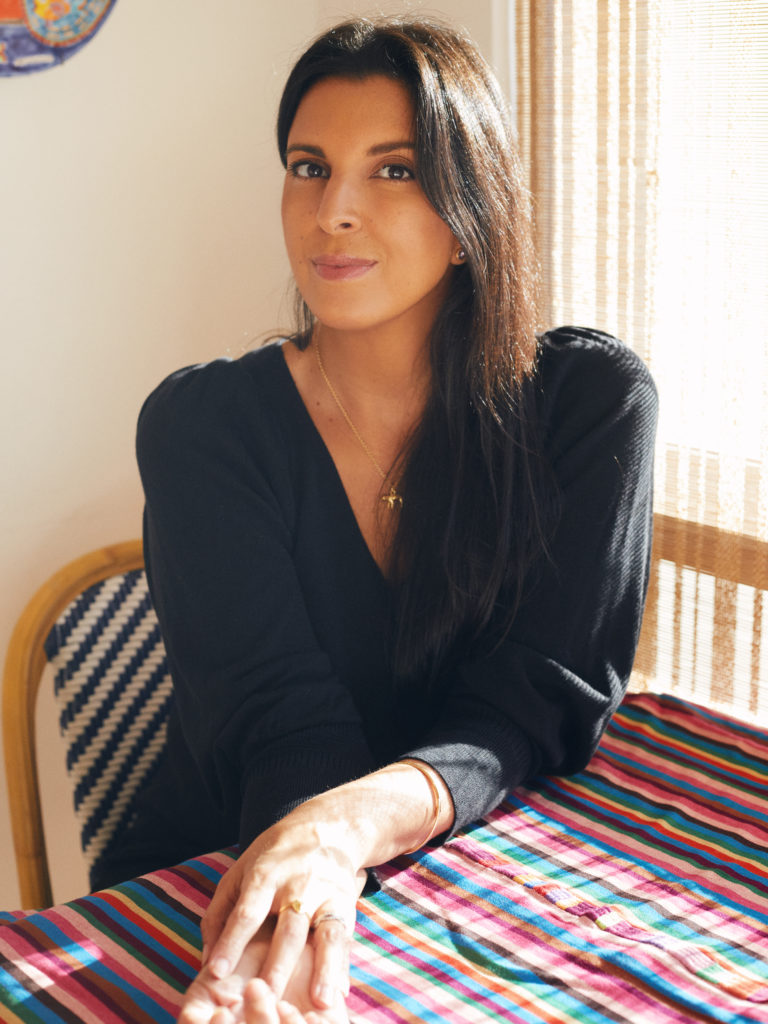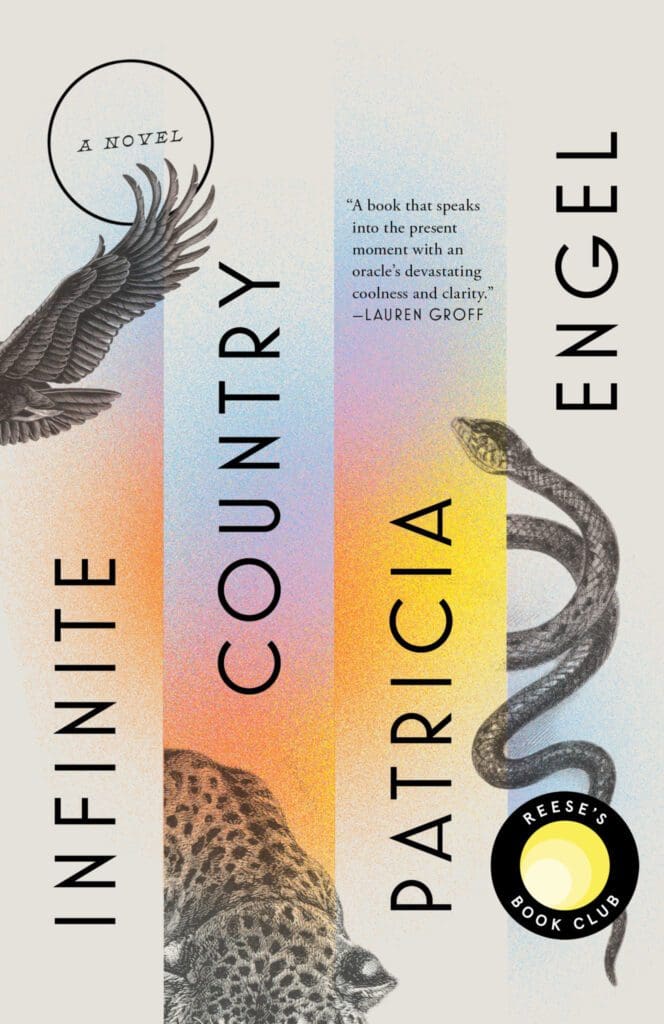In Patricia Engel’s new novel, Infinite Country (208 pages; Avid Reader Press/Simon & Schuster), the acclaimed author of Vida and The Veins of the Ocean explores a desolating aspect of the immigrant experience in the United States: the bifurcation of the heart, split between yearning for a better future and longing for the towns and cities left behind. As her protagonists contend with an immigration status that leaves them terribly vulnerable, and leads to a dreadful family separation—far from each other and from the places they still think of as home—the weight of loss is ever felt. It’s an emotion familiar to the children of immigrants, known through their parents’ stated desire of eventual return, and Engel astutely captures its expression.
Starting in the years before 9/11, Infinite Country tells the story of Mauro and Elena and their three children. It’s the engrossing narrative of a young Colombian family trying to reunite even as they live apart, and how they keep an abiding faith in each other in spite of—or perhaps because of—abuses, failings, and setbacks. There are gulfs they must traverse, geographical and sociological ones, but the novel also examines how the expanse of time moves through people, too.
Via email, we asked Patricia Engel about her new book and in the process touched upon “the parallel life” of the immigrant, how one may find themselves in this country through “the accumulation of many short-term decisions,” and “how every nation, just like every family and every person, is the product of its own stories.”
ZYZZYVA: The story of immigrants coming to the U.S. is often one framed by the assumption that an immigrant would be unambivalent about starting a life here, that living here must on its face be preferable to whatever was left behind. After all, why else would they be here? But Infinite Country interrogates that assumption. Can you tell us what your characters are sacrificing, what they’re giving up, by just trying to make a future for themselves by relocating here?
Patricia Engel: All my books explore diaspora and immigration, but with Infinite Country I wanted to go deeper into the interior life of a family in the process of emigrating, which is really an ever-evolving condition. The media and politics often put forth this idea that people who leave their homeland to come to the U.S. do so without regret. The reality, which I’ve witnessed in those close to me who’ve undergone the experience, is much more nuanced and often plagued with doubt and wondering if you made the right decision in leaving, compounded with profound homesickness and longing for your homeland, which, even if it was a dangerous place to be, is still one’s point of origin and the place that made them.
Where I live in Miami, there are support groups for the loss of homeland. This is the only place I’ve seen something like that, and I think it’s so important and valuable to honor that void and mourning as something real and powerful. I grew up around that loss and I know it never goes away, it only perhaps fades with time, dissonance, and with the distancing of new generations rooted in diaspora. In the case of the family in Infinite Country, Elena and Mauro come to the U.S. as many people do: with tourist visas and with every intention of going back to Colombia. They come in a spirit of adventure. This is the reality of so many people I know. The decision to overstay a visa, or do a brief stint in the U.S., and as time passes you’ve become something of an accidental immigrant. Elena and Mauro don’t take the long view, but instead their life in the U.S. is the accumulation of many short-term decisions, as it is for many, and the next thing you know, a decade (or two or three) has gone by.
Z: That’s one of the things your novel does so well: depicting how your characters experience time, and how they experience distance. The gulfs created by the years and the vast miles between people are truly an obstacle, yet via their memories, your characters can create bridges, albeit rickety ones, over those gulfs. Could you comment on that? Because while memories can fortify those forced apart, they can carry with them guilt and anxiety, too, no?
PE: When a person leaves their homeland, one of the hardest things to accept is that your life there will go on without you. Your community and everything you knew will not skip one second because of your absence. In my own family, I’ve observed how immigrants carry that life with them in their new country, even after years or decades of distance. There’s a parallel life and it’s packed with longing at times, and often regret or doubting if you made the right choice in leaving or if maybe you could return. All of this is even harder to navigate when you’ve left loved ones behind. In the space of the life you departed remains a sort of shadow self that is saving your spot in case you want to reclaim or recover your former existence.
Z: For a while now, the term “illegal” when referring to immigrants has been contested. Saying someone is “undocumented” is preferred. But one of your characters hates the term “undocumented.” Why?
PE: The English language is full of shortcomings. A single term that’s meant to apply to countless scenarios in which a person’s migratory status is undefined or in-process or put into question because a law has suddenly changed, the word “undocumented” has been weaponized to imply criminality, to marginalize further and deny compassion. Karina, [Mauro and Elena’s daughter], the character who says this in the novel, believes it also assigns invisibility, as if a person lacks proof for their right to be in a place, to be seen or determined to have value, which brings a person’s basic human rights into question.

Z: Without giving too much away, it’s worth noting that the structure of your novel is not as unassuming as it appears to be. The reader will reach a certain point where Infinite Country telescopes out, making us reconsider what we’ve previously been reading. Did you always have in mind this certain twist in the narrative? Or did it come about in some other way?
PE: I knew that the book would be a family chronicle, and that it would be assembled, or recounted, by one of the family members who is sort of the self-appointed family storyteller. I think in most families there is that person who is the witness for the collective; the person who is the truth-speaker, who can see the family for what it is in a broader way. I wasn’t always sure of how I’d go about the construction. I only knew that I wanted the novel to carry the same urgency you feel when you meet someone new that you connect with and they share something personal with you and you walk away from what might have been a very short encounter and feel like you got to know them in a profound, meaningful way. I hoped it could replicate that type of human experience.
Z: Infinite Country raises a question about the value of citizenship for Latinos. That is, even if you are a citizen, even if you are now “legal,” the obstacles studding your pursuit of happiness can still be considerable. I think of the way COVID has afflicted our communities and how this points out considerable disparities at large. Your novel seems to be informed by figuring out just what in the world it even means for us to be “American.”
PE: I’m old enough to remember a time when Latinos were given asylum with frequency and amnesty and residency for all sorts of skills they brought to the U.S. Immigrants have gone from being seen as a resource to being described as parasitic, and the Latin American immigrant is frequently the target of this type of discrimination. Infinite Country takes place over 20 or so years, starting in the late ‘90s, and I hope readers can see how the public perception of foreigners was manipulated drastically to serve special interests post-9/11—with the creation of the Department of Homeland Security—and following the economic recessions of the early millennium.
I think you bring up a crucial point, which is that many Latinos have said they’d feel safer in their homelands than here in the United States, when it comes to COVID. Borders have always been a fallacy, and the human species has only managed to survive thanks to its instinct for migration. So you have to ask yourself why these hurdles are created to impede a process that literally everyone in this country (except Indigenous peoples) has experienced, even if it was due to an ancestor’s dislocation. Who is this double-standard serving?
Z: There are portions of the novel relating Mauro’s upbringing where we learn about the mythology of the Muisca. Who are the Muisca, and what led you to include their understanding of the world and its origins in your novel?
PE: The Muisca were one of the most advanced Indigenous civilizations of the Americas, and populated the Andean region that is now the capital city of Bogotá, where much of Infinite Country is set, and which is also my mother’s hometown. They were largely massacred as a result of the Spanish Conquest. It was important for me to show how rooted the family in Infinite Country is to the land they’re leaving, and how Ancestral Knowledge, which some call myth and others will claim as historical truth, offers explanations for how mankind came to be, our relations to other species, and our place in the universe. It shows that humans have always been migratory creatures, and the land that makes us is carried in our DNA far deeper than we are able to understand.
Z: Does it amuse you—perhaps bitterly—that we Americans are oblivious to the pervasive violence in our own country? That it might seem incredible to some of us that somebody fleeing from, say, Central America or parts of Mexico may be understandably fearful of living here? Or coming to cities where the strength of community is nowhere on par with those they left behind?
PE: The U.S. is especially good at believing its own hype. But every nation, just like every family and every person, is the product of its own stories: those that have been told to us, those that we tell ourselves, those that we repeat so that we are unable to see anything else besides our ascribed and invented narratives. Pre-COVID, I traveled a lot, and have encountered so many people abroad who look to the U.S. as a sort of deathtrap full of random mass murder and government negligence. This country has many wonderful things to offer, and none of those are lost by acknowledging its flaws. No country or person can ever change for the better without the courage to confront its own errors or defects.

